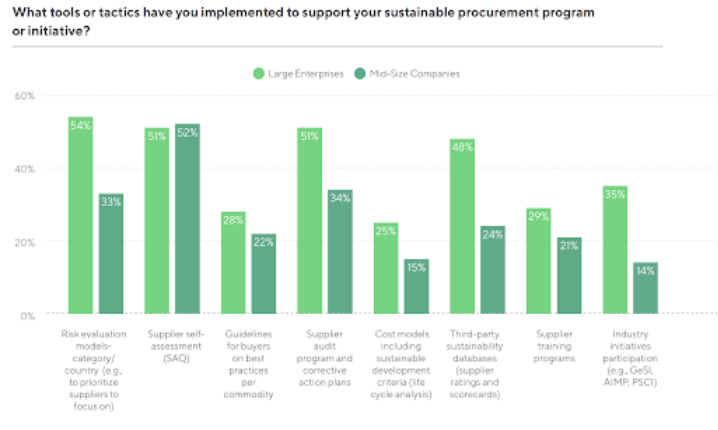Why Suppliers are Key to Unlocking Sustainable Procurement Value

1) Sustainable Procurement Helped Suppliers Endure the COVID-19 Crisis
According to the Barometer, 71% of suppliers surveyed agreed that their sustainable procurement practices helped them endure the widespread disruption caused by the pandemic. This was even greater than the number of buyers (63%) that felt buoyed by similar efforts, a signal that suppliers should actively build resilience rather than waiting for buyers to “cascade” benefits down the supply chain.
A focus on sustainable procurement can also help suppliers develop closer relationships with buyers that may pay off in times of crisis. Of our respondents, 49% indicated that sustainability criteria were “very important” or “important” for them in deciding how to support their suppliers during the COVID-19 crisis, for example by providing them with more business or offering better payment terms. While 30% of buyers stated that they support all suppliers in similar ways, this has the potential to dwindle as regulatory pressure mounts.
2) Buyers are Increasingly Using Sustainability Criteria to Evaluate Supplier
The use of sustainability criteria to evaluate new suppliers has become the norm, with 69% of respondents considering sustainability performance when selecting new suppliers and renewing contracts. More and more, sustainability is being taken into consideration not only at the beginning of the engagement with new suppliers but also throughout the relationship, with 38% of respondents including sustainability criteria in RFP/RFx/tenders and 36% addressing sustainability performance in their supplier relationship management.
It is also encouraging that 30% of respondents look at sustainability performance when implementing incentive or recognition programs, thus providing a positive incentive for suppliers to increase investment in sustainability initiatives.
“Every time we look for new supply chain partners, we check what certifications or audits they have. It may be a wonderful new technology that the market will love, but it could become a liability to both ourselves and our customers if it doesn’t come from an ethical and certified supply chain.”- Medical device components manufacturer
3) Suppliers are Key to Unlocking the Full Potential of Sustainable Procurement
Sustainable procurement practices are being adopted at scale by companies of different sizes and across geographies. However, the effective implementation of sustainable procurement programs is not without its challenges. Of the obstacles identified in this year’s Barometer, “an inability to effectively track supplier sustainability performance” and “resistance from suppliers” were ranked in the top two of concerns by 38% and 31% of respondents, respectively.
These results indicate that buying companies continue to struggle to gain visibility into their suppliers’ practices and performance. They also suggest that many buyers are eager to collaborate with their suppliers around sustainable procurement – collaboration that could represent the key to unlocking further supply chain sustainability.
4) Purpose Remains a Primary Motivator for Supplier Engagement in Sustainability
The supplier survey explored what motivates suppliers to engage in sustainability. The Barometer results show that just over half of participating suppliers implement sustainable practices for market-driven reasons: to protect their existing business (19% of respondents) and realize opportunities for growth (32%). A greater percentage of companies this year reported growth as their primary motivator than in 2019, an indication that suppliers are seeing the ever-increasing value offered by sustainable procurement.
However, one thing has not changed from our 2019 Barometer: Ethical purpose remains the primary motivator for suppliers choosing to engage in sustainability. This is an encouraging metric that signals suppliers are building the company-wide foundation and buy-in needed to develop comprehensive sustainable procurement programs that enable close collaboration with buyers.
Conclusion
The survey and in-depth interviews conducted as part of this year’s Barometer highlight how sustainable procurement has contributed to greater supply chain resilience in the face of unprecedented disruption and benefited suppliers in a multitude of other ways. As sustainable procurement increasingly becomes the norm for large and mid-size buying companies – fuelled by greater ambition around climate action and an evolving regulatory landscape – suppliers will be called upon to implement comprehensive sustainability practices and provide greater supply chain transparency.
As uncertainty lingers in the global economy, now is the time to work toward these goals. Read our Sustainable Procurement Barometer 2021 report for more insight.

